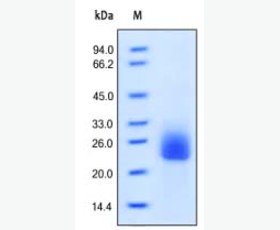Recombinant Human Poliovirus Receptor-Related Protein 2/PVRL2/CD112
| Product name: | Recombinant Human Poliovirus Receptor-Related Protein 2/PVRL2/CD112 |
| Source: | Human Cells |
| Purity: | Greater than 95% as determined by reducing SDS-PAGE. |
| Buffer Formulation: | Lyophilized from a 0.2 μm filtered solution of 20mM PB, 150mM NaCl, pH 7.2. |
| Applications: | Applications:SDS-PAGE; WB; ELISA; IP. |
| Storage: | Avoid repeated freeze/thaw cycles. Store at 2-8 oC for one month. Aliquot and store at -80 oC for 12 months. |
| UOM: | 100ug/50ug/200ug/1mg/1g |
| Source | Human Cells |
| Description | Recombinant Human Nectin-2 is produced by our Mammalian expression system and the target gene encoding Gln32-Leu360 is expressed with a 6His tag at the C-terminus. |
| Names | Poliovirus Receptor-Related Protein 2, Herpes Virus Entry Mediator B, Herpesvirus Entry Mediator B, HveB, Nectin-2, CD112, PVRL2, HVEB, PRR2 |
| Accession # | Q92692 |
| Formulation | Lyophilized from a 0.2 μm filtered solution of 20mM PB, 150mM NaCl, pH 7.2. |
| Shipping |
The product is shipped at ambient temperature. |
| Reconstitution |
Always centrifuge tubes before opening. Do not mix by vortex or pipetting. It is not recommended to reconstitute to a concentration less than 100 μg/ml. Dissolve the lyophilized protein in ddH2O. Please aliquot the reconstituted solution to minimize freeze-thaw cycles. |
| Storage |
Lyophilized protein should be stored at < -20°C, though stable at room temperature for 3 weeks. Reconstituted protein solution can be stored at 4-7°C for 2-7 days. Aliquots of reconstituted samples are stable at < -20°C for 3 months. |
| Purity |
Greater than 95% as determined by reducing SDS-PAGE. |
| Endotoxin | Less than 0.1 ng/µg (1 IEU/µg) as determined by LAL test. |
| Amino Acid Sequence |
QDVRVQVLPEVRGQLGGTVELPCHLLPPVPGLYISLVTWQRPDAPANHQNVAAFHPKMGPSFPSP KPGSERLSFVSAKQSTGQDTEAELQDATLALHGLTVEDEGNYTCEFATFPKGSVRGMTWLRVIAK PKNQAEAQKVTFSQDPTTVALCISKEGRPPARISWLSSLDWEAKETQVSGTLAGTVTVTSRFTLV PSGRADGVTVTCKVEHESFEEPALIPVTLSVRYPPEVSISGYDDNWYLGRTDATLSCDVRSNPEP TGYDWSTTSGTFPTSAVAQGSQLVIHAVDSLFNTTFVCTVTNAVGMGRAEQVIFVRETPRASPRD VGPLVDHHHHHH
|
| Background | CD112 is a type I transmembrane glycoprotein belonging to the Immunoglobulin superfamily. It comprises one Ig-like V-type domain and two Ig-like C2-type domains in the extracellular region. The V domain is believed to mediate nectin binding to its ligands. Nectin2 is known to bind the pseudorabies virus, and herpes simplex virus2 (HSV2), involving in cell to cell spreading of these viruses. It does not bind poliovirus. As a homophilic adhesion molecule, CD112 is found concentrated in adherens junctions, and exists on neurons, endothelial cells,epithelial cells and fibroblasts. CD112 has been identified as the ligand for DNAM-1 (CD226), and the interaction of CD226/CD112 mediates cytotoxicity and cytokine secretion by T and NK cells. The costimulatory responses may be a critical component in allergic reactions and may therefore become targets for anti-allergic therapy. |














